
Text and photos copyright 2018 Pamela Ellgen. Design and concept copyright 2018 Ulysses Press and its licensors. All rights reserved. Any unauthorized duplication in whole or in part or dissemination of this edition by any means (including but not limited to photocopying, electronic devices, digital versions, and the internet) will be prosecuted to the fullest extent of the law. Published in the United States by: ULYSSES PRESS P.O. Box 3440 Berkeley, CA 94703 www.ulyssespress.com ISBN: 978-1-61243-813-9 Acquisitions editor: Bridget Thoreson Managing editor: Claire Chun Editor: Renee Rutledge Proofreader: Shayna Keyles Front cover design: David Hastings Production: Jake Flaherty Distributed by Publishers Group West NOTE TO READERS: This book has been written and published strictly for informational and educational purposes only.
It is not intended to serve as medical advice or to be any form of medical treatment. You should always consult your physician before altering or changing any aspect of your medical treatment and/or undertaking a diet regimen, including the guidelines as described in this book. Do not stop or change any prescription medications without the guidance and advice of your physician. Any use of the information in this book is made on the readers good judgment after consulting with his or her physician and is the readers sole responsibility. This book is not intended to diagnose or treat any medical condition and is not a substitute for a physician. This book is independently authored and published and no sponsorship or endorsement of this book by, and no affiliation with, any trademarked brands or other products mentioned within is claimed or suggested.
All trademarks that appear in ingredient lists and elsewhere in this book belong to their respective owners and are used here for informational purposes only. The author and publisher encourage readers to patronize the quality brands mentioned in this book. CONTENTS Table of Contents
Guide
A lectin-avoidance diet is nothing new. For thousands of years, humans have understood that certain compounds in foods are dangerous, and have figured out ways to avoid them. Soaking and sprouting grains and legumes, avoiding unripe fruits, tossing out green potatoes, peeling tough vegetables, avoiding certain plant seeds, and fermenting food to improve its digestibility are all ancient practices designed to maximize the benefits of healthy food and minimize the harmful effects. Global cultures have passed on these food traditions for millennia.
Modern Western food culture does not share this ethos. It is founded on what tastes good, what looks good, what has maximum profitability, and what will last the longest on the shelf. We dont really think about what our ancestors ate. Our food culture is transmitted through the television, not tradition. Even more concerning, our diet is built around a handful of staple foods that are highly inflammatory and, in most cases, loaded with lectinswheat, corn, soy, sugar, dairy, and meat. Oh, and our favorite vegetable: potatoes.
In toxicology, the underlying principle is that the dose makes the poison. Our doses of these foods are leaving us with unprecedented levels of overweight and obesity, metabolic syndrome, and autoimmune disorders. Fortunately, there is a solution. And, as I hinted at before, it isnt all that groundbreaking: return to the food traditions of generations past and see a reduction in many of our chronic health problemsespecially those we have assumed were just part of life. Our great-great-grandparents may not have known the word lectin, but they knew how to prepare and enjoy food to minimize its deleterious effects. We can glean from their traditions and look to modern science as we hunt and gather our way to a reduced-lectin diet.
In this book, my goal is to blend ancient wisdom with the latest science to create delicious recipes that will help you reduce inflammation, lose weight, and prevent disease. One of the most famous, or should I say infamous, lectins is gluten. Today, we know it as the scourge of people with celiac disease. Even a crumb of wheat, barley, or rye can damage the lining of their small intestines and lead to malnutrition and disease. According to mounting research, it also affects individuals who dont have celiac disease but suffer from many of the same symptoms and get the cumbersome label, non-celiac gluten sensitivity. However, in the early 1900s, scientists didnt even consider gluten a possible culprit in celiac disease.
They had observed it for centuries and documented its effects in medical journals, but its etiology was hardly understood. Popular treatments ranged from the bizarre1 quart of mussels a dayto nearly impossible200 bananas a week. And yet, no one thought to point the finger at gluten. In the 1940s, a doctor in the Netherlands observed that the death rate for children with celiac disease plummeted from more than 35 percent to virtually zero during the Dutch famine when wheat flour was unavailable. The death rate returned to those staggeringly high levels when the famine was over and celiac children could eat bread again. He made the connection then between wheat and celiac.
It wasnt until the 1950s that scientists established a solid link between the gluten in wheat and celiac disease, and could finally confirm its presence by physical damage to the small intestine. Why the history lesson? Because our knowledge of the effect of lectins is still at about that of the 1940s. Like the Dutch physician, some modern doctors have made the observations, such as Dr. Steven Gundry in his clinic and in his book, The Plant Paradox, along with many writers and lay scientists in the paleo community. But, the actual mechanism by which lectins make some people sick and overweight is poorly understood and poorly documented in scientific literature, with few credible clinical studies in humans about the effects of lectins. Nevertheless, we can see the effects of a low-lectin diet in our own bodies and in others who have adopted a low-lectin diet.
We could wait another decade for clinical research to come along and support the protocol, or we could exclude the handful of foods that make us feel sick. This book offers the recipes to help you do that. But first, heres what science does tell us definitively about lectins. What Are Lectins? Lectins are proteins that bind to carbohydrates. They are found in virtually all living thingsplants, animals, bacteria, and fungiand have a myriad of biological functions within these organisms. In animals, they are involved in cell adhesion, cell reception, and immunity.
In plants, they are involved in growth and possibly serve as a defense against predators. Lectins are present in about 30 percent of our foods and are especially concentrated in the seeds and skin, or hull, of certain plants. They are also present in the animals we eat for food, especially when those animals have consumed a high-lectin diet (grain fed and soybean fed). The greatest concentrations of lectins in the human diet are found in legumes, grains, dairy, and nightshade plants, including tomatoes, potatoes, eggplant, and peppers. Hence, all of the recipes in this book exclude those foods entirely. Some fruits that are usually thought of as vegetables contain low levels of lectins and can be problematic for some people.
These foods include summer and winter squashes, cucumbers, and melons. I have used these ingredients sparingly in this book because most people find them tolerable.



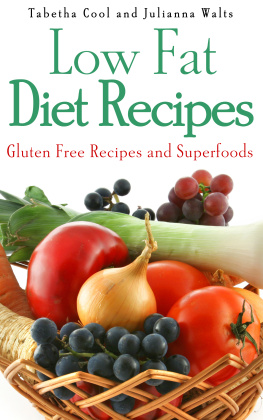
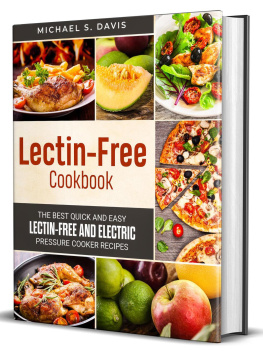
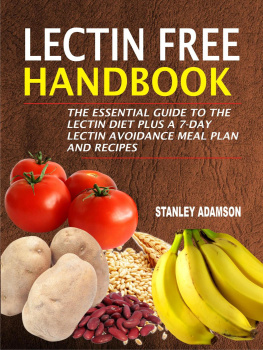
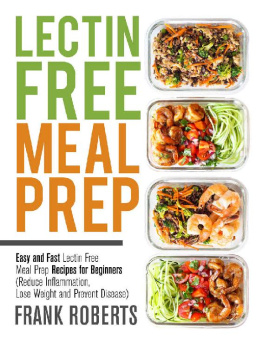
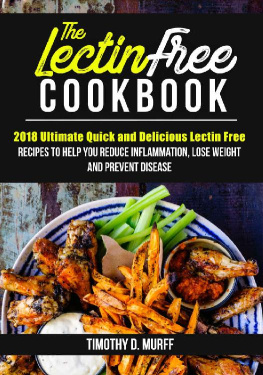
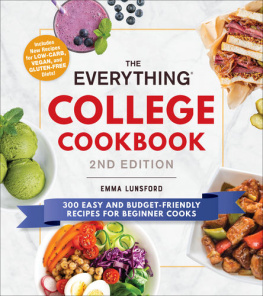
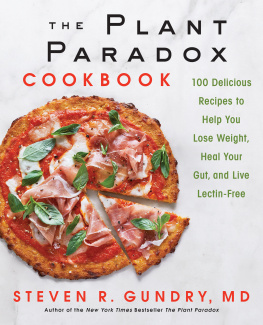
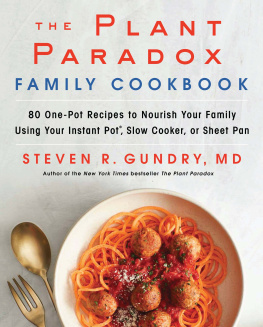
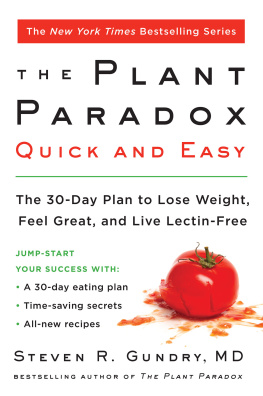
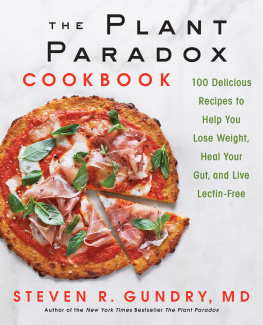
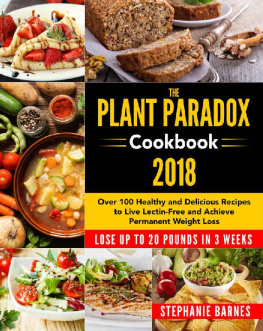
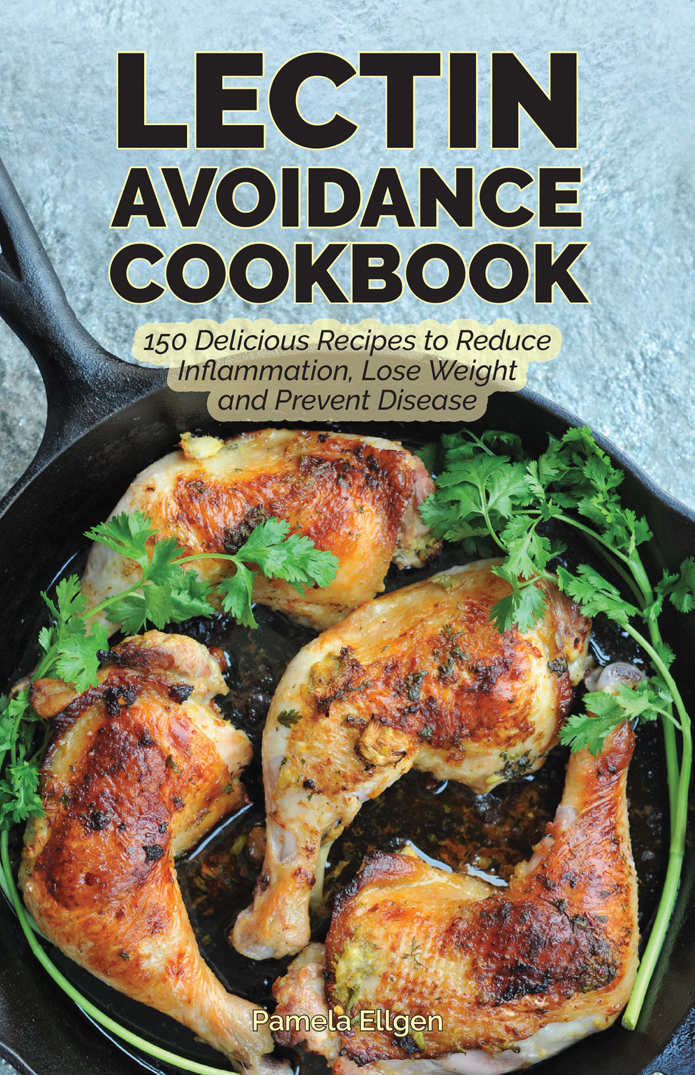
 Text and photos copyright 2018 Pamela Ellgen. Design and concept copyright 2018 Ulysses Press and its licensors. All rights reserved. Any unauthorized duplication in whole or in part or dissemination of this edition by any means (including but not limited to photocopying, electronic devices, digital versions, and the internet) will be prosecuted to the fullest extent of the law. Published in the United States by: ULYSSES PRESS P.O. Box 3440 Berkeley, CA 94703 www.ulyssespress.com ISBN: 978-1-61243-813-9 Acquisitions editor: Bridget Thoreson Managing editor: Claire Chun Editor: Renee Rutledge Proofreader: Shayna Keyles Front cover design: David Hastings Production: Jake Flaherty Distributed by Publishers Group West NOTE TO READERS: This book has been written and published strictly for informational and educational purposes only.
Text and photos copyright 2018 Pamela Ellgen. Design and concept copyright 2018 Ulysses Press and its licensors. All rights reserved. Any unauthorized duplication in whole or in part or dissemination of this edition by any means (including but not limited to photocopying, electronic devices, digital versions, and the internet) will be prosecuted to the fullest extent of the law. Published in the United States by: ULYSSES PRESS P.O. Box 3440 Berkeley, CA 94703 www.ulyssespress.com ISBN: 978-1-61243-813-9 Acquisitions editor: Bridget Thoreson Managing editor: Claire Chun Editor: Renee Rutledge Proofreader: Shayna Keyles Front cover design: David Hastings Production: Jake Flaherty Distributed by Publishers Group West NOTE TO READERS: This book has been written and published strictly for informational and educational purposes only.